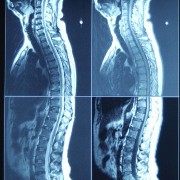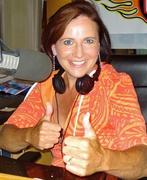 Photo: Getty Images
Photo: Getty Images
Sometimes, pain and weakness just don’t go away with standard, non-invasive approaches such as medicine and physical therapy. When the pain associated with a certain condition is non-responsive to the traditional treatment approaches, surgical intervention may be necessary. This is especially true for those individuals who may be suffering from a bulging or herniated disc, degenerative disc disease, or consistent neck and/or arm pain.
Anterior cervical discectomy and fusion, also known as ACDF, is a procedure wherein a herniated or degenerative disc in the neck (the cervical area) is removed. The surgeon will approach the spine from the front, working through the throat area. He will remove the affected disc, and then fuse together the vertebrae above and below the space where the disc was removed. While this sounds complicated, patients are typically released to go home the same day and the recovery time takes anywhere from four to six weeks.
ACDF can be performed to relieve the pressure placed on neural structures by a herniated disc or bone spur that is irritating the nerves and causing pain in the neck and/or the arms. Patients may also realize a loss of coordination, weakness, or numbness in the arms and fingers. When pressure from the affected disc or discs is placed on the spinal cord, it can also affect most of the nerves in the rest of the body, creating pain in other areas, such as the chest, the abdomen, and the legs.
The ACDF procedure allows for the removal of all or part of a disc and the insertion of a bone graft to replace that disc.
A discectomy, or cutting out of a disc, can be done anywhere along the spine, from the neck to the lower back region. In some cases, more than one disc may be removed. After the disc is removed, the surgeon must fill the open disc space with a bone graft. This will serve as a bridge between the disc above the space and the disc below, creating a spinal fusion.
The bone graft and other vertebrae are immobilized and held together with metal plates and screws. Post-surgery, the body will begin its healing process, and new bone cells will begin to form around the graft. Within three to six months, the bone graft should join the adjacent vertebrae to form one solid piece of bone. The bone may even grow around the plates and screws.
How do you know if you are a candidate for such a procedure? If you have had certain diagnostic tests that evidence a herniated or degenerative disc, if you are experiencing arm pain that is worse than neck pain, and/or if you have symptoms that have not improved despite medication and physical therapy, a consultation with your doctor may be in order to determine if you should undergo an ACDF procedure.
ACDF can be helpful in the treatment of bulging and herniated discs and with degenerative disc disease. Typically, most herniated discs heal on their own accord within a few months of medicinal or physical therapy measures. If surgery appears to be your next option, be sure to discuss all benefits and risks with your physician. Statistics show, however, that only about 10 percent of those individuals with herniated disc problems present with enough appreciable pain after six weeks of non-surgical treatment methods to consider surgery.
Sources:
http://www.necksurgery.com/treatment-surgical.html www.mayfieldclinic.com/PE-ACDF.htm






Add a Comment2 Comments
Im glad your feeling better Poochie wochie
The Ortho Dr. told me I need surgery. I have a herniated bulge disc L5 and I need all the advised that I can get..
March 18, 2015 - 9:42pmThis Comment
I had this done on 1/11/12. My problems started after a car accident and the symptoms appeared one month later when I woke up with excruciating neck pain. I suffered for 7 months-tried all the narcotic meds they prescribed(which do little for nerve pain) Neurontin, which made me dehydrated and I had to go to the ER, PT which made it worse, and one epidural. My problems were a herniated disc at c4-5 and a herniated disc that was a central cord protrusion at c5-6. I also had foraminal narrowing.
Was sent to some idiot who told me my MRI was normal for a woman my age and that because I had pain on both sides of my upper body it wasn't my spine causing the problems. He then gave me a shot of a muscle relaxer in the neck and manipulated it. Later found out that's the worse thing you can do to someone with herniated discs and spinal stenosis.
When I started to get numbness in my left leg I decided to try the other hospital system in my city. The ER doc referred me to their on call NS in November and I saw him in December. He said I had a significant spinal cord compression that needed to be addressed and said that since all the conservative treatment hadn't worked the next step was surgery. It was my choice to either wait or do it now if I was sick of the pain. He also threw in the compression at c4-5 saying it would help the arm pain. I said I wanted the surgery and it was a go.
It's now been almost 5 weeks and I'm so glad I had this surgery. The pain in my muscles is completely gone. I still have some numbness in my left arm though. On the day of the surgery the surgeon did some resistance tests on my hands and I couldn't prevent him from pushing my left hand down. I also had the Hoffmann sign-that's a test that tells them if you have nerve impingement. During the post op appointment the hoffman sign was okay but I still had a little bit of a hard time with the resistance test on the left hand. The left arm was the worse but my right arm was starting to hurt bad right before the surgery-I was told that was because the disc was compressing my spinal cord. So that contradicts the idiot I was referred to in August.
I'm also glad I decided to go to the other ER. If I hadn't who knows where I would be now. The pain doctor the first ER sent me to did one epidural during the 13 weeks I saw him. To his credit he was the first and only medical person that I saw before my wonderful neurosurgeon who said I was probably going to need surgery.
I have no second thoughts about doing this. The stabbing pain in my neck and arms are gone and I'm not spending my days and nights with a heating pad. I had a bleeding ulcer in the early 90's and even this beats that as the worse pain in my life.
February 12, 2012 - 10:20pmThis Comment